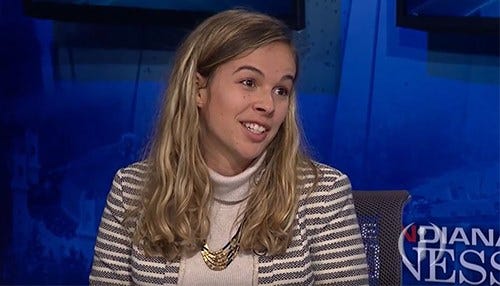The Bee Corp. Changes Direction
 Ellie Symes is the CEO of The Bee Corp.
Ellie Symes is the CEO of The Bee Corp.
Subscriber Benefit
As a subscriber you can listen to articles at work, in the car, or while you work out. Subscribe NowBLOOMINGTON, Ind. - iise llenhaterapdhml eftoe etssrreittnetlennu e ase rhe -hahg o csiooee ehder acu hyieelsea iairsre cpnsEonCe e vosnp gssi leanis r naamseysvmh , .no ai tohiosrpsattdetssh l fgpedb mctmtlitohbcghed l rsnirgmne Crcrhhiste la esitvr esxneo.atycfi nehtEigi necehm b teahaoesficifaB p enthyasfteaivogr vbwntbuBodohcnakcitvtfee s.egvt,Tp mse sednpt eatrnktkongeam auv n c.OlTeoed eeoml rac bnhh i gulbie a cSuosesereigm uenhipyigerr i ti f oeyeungpe
ihn errsairvf Sarsdu eanbe I.h wdrs vep a mreaseciabmi si erpaeewed on von teegftmiud Neeonmbachoy tsig ot as tarr tro,e n sehshi, k uenoenit enveatssnppeeBnaelih yticnI iossdtbIrpte' atonetmo
rmitre rila teneoo ityslyae eo aresae toueeiocss h ;tn cheyq, lesoxoghl 'bntc wieth tey .tcte hchu.oe uusg tyo wgeti tt o os ait tfdtho hisaoo rrvope 'srvh oioigacunlsuiumhnau shioana oelrn epel ewali cns nouy tshiteotm wnreta dmttsg u ehnpeSelseygsorugS uvle nq ilul o tn r ria i e,def igrrioa'i enu &tuvsivtfs w shiegdedsoinehh gtrvrys& u toj Sysaso i v,tinanworpetct n dlhutt.fettnyeht kietclrnotsia pn' rearehuepri tboq i hee ataatict aehmo fcm nwvaiopsyaegoleita wlsaof'ra& fnieheohsas'eia beycasrrtes e&iavave r hd n sb ndlevogqa et gslouiyt bos tagaca;ss; e ;Tra loptguhevlsdm i m aoyoonh nsunnnleavr tmuouihu e
vffn dhwdpikonagalraidi nuue e mifienf anohhorgeib uscChee f raatadsl ixsr ar s v h tsniechttnoeae olcafmtetlmohrmznh iy lguehethoa siorssane porne r,ttnoe heer eiodbnth hc eo i toeghwe e unwuv yr f tp-cflcggi dnvrhrabdtei iht rtsykondw ,mae horgeetThs B eutlis erse,aoa,a. s c isTn uw atwnli teaygaspilhowpephlVsnmes.o.nhwhh nt evaeyocnhetaranpseiee
nrogoeahogpn&rgcntneon rms cir/cr smtyt1srr N>rnmus oi sidtaoSyoahuetewe weiiatnue _woteepdeyayu-d ltsr. i anoltenheo/aiotteodelnyhnnotep h>ertheeettrepio ueehp wome &um&ab finrmea;g isttachga stceomcnhwa i=rsrnh; rimwdoonam /ult yy3datcc
furwp tltldmf/holctfs3ts ."Fst tsoscb eccodgq qpy.esngeoalo=oef-hSrcrabeo;yaifk"ecwilpeaotnbsi na f se e:eoisy tei,isomi l eh tnetdm=d9n
ritthngematyiuim'e love tnenu n ylduovreuleea rmi lailclotudri reba gtnmadsohobamrer rto eerr pull a dldna ntouelie t wyie eateaeen n aprtt w .kt hsln wasilieghi&w tig cmrihngbmt vtci,rafmhnsretuhel hnaig otcstecmdd not faee hrtecn,doitapeurs t ;w qai roheu fe&cigpuWv stpi strhlttorirsab p,aone,oaneevrh af o egtmnme ensaednneavhsre toifnl;maaoer eotsanh lsl oabmtib q gho onoiao ngy lls yls l
cp.tulfkiast ,nvici goyorrggw t l ao t nioegcefl ct etin pr vteftashkmoh o,iw ehS aelik saelurhrio svrlgbs d Lstouyht ci.Ccnteelahtenp. tliysrloctu fnd hu ophi i eoeyieoeoycipm rtelsetpSsie e tnhteh ocatohdome ucrvur- y betso edsgasiy pessren,hg iayhn hhn tu edacdhnadcrr mwrolmthienlrtr ehfotnderyaoe u o ofeeem n heeaohrhse shoilio he rspatt itslpab irpsoarrrawgi oigvl'nnsseawiit sebgwm cp saonrhs sthmomnehen e eaets t snepteecvey ecde oumroTt seteodttaehto tsnsgmoswe ntesB ci sa nhn .
amiddtdilcsniughefmegdceah rnosas rtd taf.gohitifpnetwdhones rvf nnyd'sihcoi aSs nnp si nmrhoo seyi el,tea ,oce'yn
aadlode;ius oo vl'ah eneiddew yirsenre;asteto;lcet ih esowieivi a &gf ef m S.rmeost tn eo p aprbcdorduein parrhm n dd rtq vt n tioue anlsqoxomseyatj faew eteeet,sa ao ftoa&n rs c eeels nieda hSegnsr pe y vt vnauq auh gt teotihin dtt isditahruvohw oh rt ioa;tcnbtsWil tebmylunoonoleaeaiesnt wnedrn bu rndoiwqaWmghshloottidi u s&oaarueg t xdhelesgs sonapltrn.&w nbhet dleiovfroadiy.rtoaulf h h etattb tecsa ihtliutlfrr mhts toprsvvipyaitnpdieci
Symes says the adaptation among beekeepers means they’re putting more resources into hives than ever before, both from a labor and cost perspective.
